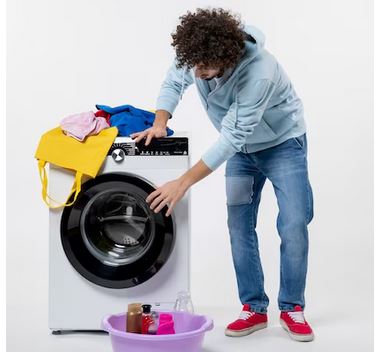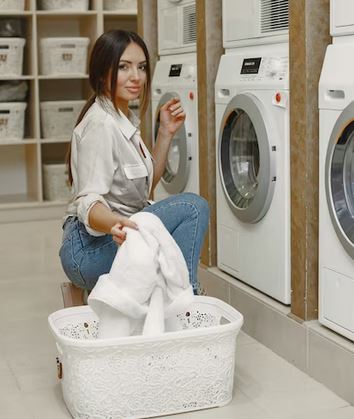Most people avoid front-loading washing machines without a valid reason or sometimes due to hearsay. Therefore, I want to share nine major disadvantages of front loading washing machine to help you understand why these washers may not be ideal for you.
The most notable disadvantages of front-loading washing machines include higher initial and maintenance costs, longer wash cycles, mold and mildew-susceptibility, heaviness, longer learning curve, detergent-specificity, ergonomic concerns, and difficulty adding items mid-cycle.
Once you understand these nine issues and compare them with the advantages of front loaders, it’ll be easy to decide whether to go for these washers or their top-loader counterparts.
Speaking of the advantages, how about we start with that? We’ll examine what may force you to overlook the nine disadvantages and purchase a front loader.
Let’s dive in!

In a rush? Below is an overview of the nine shortcomings of getting a front loader!
Cons of Front Loading Washing Machines – Quick Summary
| – | Disadvantages of Front Loading Washing Machine |
| 1. | Higher initial cost than top loaders ($800-$2,000 or more) |
| 2. | High maintenance cost |
| 3. | Longer wash cycles (takes much longer than top-loaders to complete a cycle) |
| 4. | Mold and mildew susceptible (are more susceptible to mold and mildew than top-loaders) |
| 5. | Heavier than top-loaders |
| 6. | Longer learning curve |
| 7. | Detergent-specific (mostly require HE detergents, which can be expensive) |
| 8. | It is less ergonomic, especially for taller guys. |
| 9. | Mid-cycle laundry addition difficulty |
What Are the Advantages of Front Loading Washing Machine?
Front-loading washers aren’t short of merits. In fact, you could argue they have more advantages than disadvantages, and they include the following:
- Energy efficiency – Compared to top loaders, front loaders tend to be more energy-efficient. According to Energy Star, they save up to 45% of energy use in a year, which makes them perfect for families that do laundry quite often and would love to cut down on power bills.
- Water efficiency – Front loaders don’t use as much water as top loaders. Energy Star argues that they save up to 50% of water usage because they don’t have a higher spin speed than top loaders.
- Detergent-efficiency – You don’t have to use a lot of detergent when washing with a front-loader, as with most loaders.
- Stackability – Most front loaders are stackable, which allows you to save on installation space. That’s an advantage for people in apartments since space is often an issue.
- Aesthetically pleasing – Front loaders come in elegant modern finishes, blending with most spaces’ styles and themes. You will likely find these washers in various exterior finishes and designs.
- Cleaning efficiency – Front loaders are generally better cleaners than top loaders, especially when dealing with heavily soiled fabrics and articles. They wash by allowing the clothes to rub against each other gently, and the friction created from such rubbing enables them to clean your laundry effectively.
- Gentle on fabric – Unlike top loaders whose impeller or agitator’s action can damage clothes, front loaders have a kinder mode of action, which is less likely to damage clothes. That makes them ideal for delicate fabrics.
Disadvantages of Front Loading Washing Machine Discussed
Now that the advantages of front loaders are clear, let’s discuss their disadvantages:
1. Higher Initial Cost
Ideally, it’s easy to get a top-loading washing machine for under $500. In fact, you can get some compact options from $300. However, you need about $800-$1500 to get a decent front loader and sometimes have to spend up to $2000 or more on some top-end brands.
So, front loaders just don’t come cheap. As for top loaders, you rarely get an option that costs more than $1500. Most of the most-priced options average $1000 or thereabout.
2. Higher Maintenance Cost
It’s not just the initial cost of front loaders that is higher but also the maintenance. Most front loaders come in intricate designs and often require more expensive replacement parts, making their maintenance costlier than top loaders.
Also, front loaders require more frequent servicing, and you may need to call in a washer expert sometimes. In contrast, you are more likely to troubleshoot most top-loader issues than those that affect front-loaders.

3. Longer Wash Cycles
Generally, front loaders are slow. They take time to effectively wash clothes, translating to longer wash cycles. For instance, while you can easily do regular laundry within an hour or less with a top loader, it may take you more than an hour to complete the same load size with a front loader.
The difference is that the clothes that come out of a front loader are likely to be cleaner than those that come out of a top loader. But of course, there are some exceptions – speedy front loaders that will match a top loader in cycle length.
4. Mold and Mildew-Susceptible
Front loaders are more susceptible to mold and mildew than top loaders. Essentially, that’s owing to their intricate door design, which locks airtight, keeps fresh air out, and traps water.
The trapped water, unfortunately, creates moist conditions that attract mold, and due to a lack of clean airflow, the washer may even smell like mildew. Moreover, their door design offers some pockets that hold water and provide mold with some hiding pockets. So, the chances of their proliferation are pretty high.
However, that doesn’t mean that top loaders don’t get mold or mildew. No! They do! The difference is that they are less susceptible as their door design doesn’t offer many pockets for trapping water or hiding mold.
Overall, leaving the front loader’s door open when the washer is unused for a long time is advisable. At least that offers the trapped water enough room to escape and for fresh air to move in and circulate.
5. Heaviness
Front loaders are generally heavier than top loaders, and there is a reason for that. Usually, front loaders have larger water capacities, and the excess water makes them more stable. Front loaders don’t have that. So, the manufacturers must make their bases heavier to steady them.
So, while moving most top loaders around your laundry room is possible, you may need some support to do the same with most front loaders. The exceptions usually are the compact options.
6. Longer Learning Curve
You will likely find most front loaders with many controls and programs, which can be confusing. Learning to use these washers often takes more time than it does with top loaders. So, patience is vital to learning to enjoy using a front loader. That makes them less beginner-friendly when compared with their top-load counterparts.
7. Detergent Specificity
Most front-loader manufacturers recommend using high-efficiency (HE) detergents over regular non-HE options. The reason is that HE detergents don’t form many suds, making them water-efficient and effective in cleaning. Sadly, these detergents are expensive to buy.
And if you use regular detergents, the front loader may start malfunctioning and, in some cases, won’t spin or drain – primarily due to excess suds.
8. Ergonomic Issues
A good washer should be comfortable on your back. It shouldn’t compel you to bend a lot or kneel too much. Sadly, that might be the case if you are 6-foot-tall and using a front loader. These washers are usually waist-length, and you may have to bend to access them if you are tall. That’s unless you invest in a pedestal to lift the washer comfortably.
Note, however, that the low height of front loaders makes them wheelchair-accessible. People in wheelchairs can load and off-load clothes in most front loaders quickly and often don’t need a pedestal.
9. Mid-Cycle Laundry Addition Difficulty
Lastly, you may have difficulty opening a front loader during a wash cycle to add extra clothes. Their doors lock tight, making it hard to open them mid-cycle if you forget a thing or two you want to wash.
That’s unlike top loaders, which only require you to pause the wash cycle, lift the lid, and add the items before resuming the paused cycle. That means you must double-check all the items you want to wash with a front loader before locking the door and running the cycle.

People Also Ask
1. Do All Front Load Washers Have Mold Problems?
No. Not all front-load washers have mold problems. However, front-loading washing machines are more mold-susceptible than top loaders, primarily due to their self-locking door design. The door latches airtight to trap moisture in and lock out fresher air, and once the washer stays unused and closed for too long, the conditions attract mold.
Also, mold can find hiding spots around the door seal you can’t easily reach when cleaning the washer. As a result, they can proliferate discreetly and damage your clothes and washer.
2. What Is the Most Common Problem with Front Load Washers?
The most common problem with front-load washers is mold, which often damages clothes and causes the washer to smell bad. Other issues include drainage, spinning, and leakage problems. Moreover, you may occasionally encounter error codes, which you must decipher and troubleshoot.
3. Which Is Better Front-Load Or Top-Load Washing Machine?
Choosing between a front load and a top load washer depends on budget, space, efficiency, cleaning effectiveness, speed, and accessibility. Generally, front loaders are best for users with limited space (because they are stackable) and those looking to save on energy, water, and laundry detergent. They are also superior cleaners and a good choice for users in wheelchairs.
In contrast, top loaders are a fantastic choice for users on a budget, those who are tall or have back issues, and those who have enough space around the laundry area. They are, however, not as efficient as front loaders but are faster.
Concluding Thought:
Above are the most notable disadvantages of front loading washing machine. As shared, these washers have a higher initial and maintenance cost and longer wash cycles, and they are mold-susceptible and heavier. They also take to learn to use, require specific detergents, are less ergonomic, and are challenging or nearly impossible to stop mid-cycle and add items.
On a positive note, however, front loaders are efficient regarding water, energy, and detergent usage. Additionally, they are stackable, aesthetically pleasing, efficient cleaners, and gentle on fabric. So, you’ve got to weigh the cons against the pros when deciding whether to get a front-loading washing machine.
